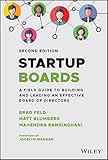Startup boards: a field guide to building and leading an effective board of directors
Material type: TextPublication details: John Wiley & Sons, Inc. New Jersey 2022Edition: 2ndDescription: xx, 235 pISBN:
TextPublication details: John Wiley & Sons, Inc. New Jersey 2022Edition: 2ndDescription: xx, 235 pISBN: - 9781119859284
- 658.11 FEL
| Item type | Current library | Collection | Call number | Copy number | Status | Date due | Barcode | |
|---|---|---|---|---|---|---|---|---|
 Book
Book
|
Indian Institute of Management LRC General Stacks | Public Policy & General Management | 658.11 FEL (Browse shelf(Opens below)) | 1 | Available | 004480 |
Browsing Indian Institute of Management LRC shelves, Shelving location: General Stacks, Collection: Public Policy & General Management Close shelf browser (Hides shelf browser)
A comprehensive guide on creating, growing, and leveraging a board of directors written for CEOs, board members, and people seeking board roles.
The first time many founders see the inside of a board room is when they step in to lead their board. But how do boards work? How should they be structured, managed, and leveraged so that startups can grow, avoid pitfalls, and get the best out of their boards? Authors Brad Feld, Mahendra Ramsinghani, and Matt Blumberg have collectively served on hundreds of startup and scaleup boards over the past 30 years, attended thousands of board meetings, encountered multiple personalities and situations, and seen the good, bad, and ugly of boards.
In Startup Boards: A Field Guide to Building and Leading an Effective Board of Directors, the authors provide seasoned advice and guidance to CEOs, board members, investors, and anyone aspiring to serve on a board. This comprehensive book covers a wide range of topics with relevant tips, tactics, and best practices, including:
Board fundamentals such as the board's purpose, legal characteristics, and roles and functions of board members;
Creating a board including size, composition, roles of VCs and independent directors, what to look for in a director, and how to recruit directors;
Compensating, onboarding, removing directors, and suggestions on building a diverse board;
Preparing for and running board meetings;
The board's role in transactions including selling a company, buying a company, going public, and going out of business;
Advice for independent and aspiring directors.
Startup Boards draws on the authors' experience and includes stories from board members, startup founders, executives, and investors. Any CEO, board member, investor, or executive interested in creating an active, involved, and engaged board should read this book—and keep it handy for reference.
There are no comments on this title.







